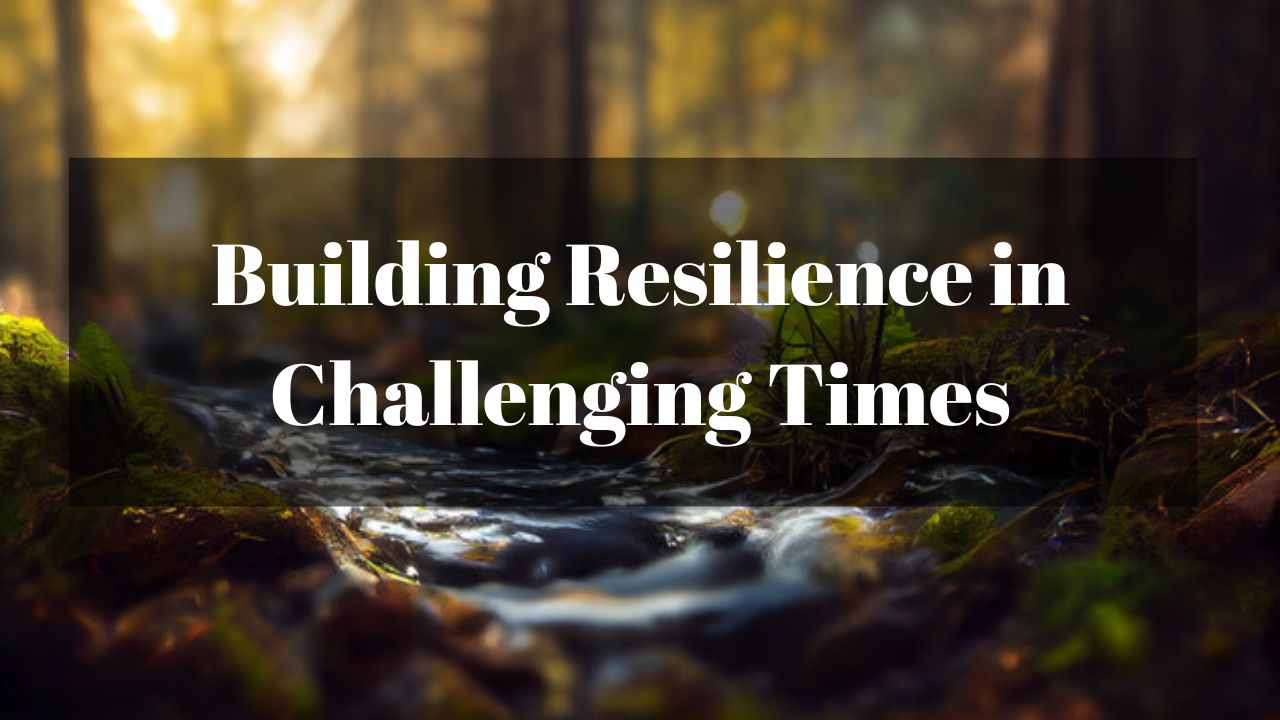Building Resilience in Challenging Times
In the face of life’s inevitable challenges and uncertainties, building resilience becomes a crucial skill that empowers individuals to navigate adversity, bounce back from setbacks, and emerge stronger. Resilience is not just about enduring difficulties; it’s about adapting, learning, and thriving in the face of adversity. This article explores practical strategies to build resilience in challenging times, fostering personal growth and well-being.
Cultivate a Growth Mindset:
A growth mindset is the foundation of resilience. Embrace challenges as opportunities for learning and growth rather than insurmountable obstacles. Understand that abilities can be developed through dedication and effort. This mindset shift transforms setbacks into valuable lessons, fueling resilience in the face of adversity.
Establish a Supportive Social Network:
Strong social connections are a cornerstone of resilience. Cultivate a supportive network of friends, family, and colleagues who provide emotional support, encouragement, and understanding. Share your experiences, lean on others when needed, and reciprocate support to create a resilient community.
Practice Mindfulness and Self-Compassion:
Mindfulness and self-compassion are powerful tools for building resilience. Practice being present in the moment, acknowledging your thoughts and emotions without judgment. Treat yourself with the same kindness and understanding you would offer a friend. Mindful self-compassion enhances emotional well-being and resilience.
Develop Coping Strategies:
Identify and develop effective coping strategies to manage stress and adversity. This might include mindfulness techniques, deep breathing exercises, or engaging in activities that bring joy and relaxation. Building a toolbox of coping mechanisms equips you to navigate challenges with a greater sense of control and calm.
Set Realistic Goals:
Establishing realistic and achievable goals helps break larger challenges into manageable steps. Celebrate small victories along the way, reinforcing a sense of accomplishment and progress. Setting realistic goals provides a roadmap for moving forward and building resilience through incremental successes.
Adaptability and Flexibility:
Cultivate adaptability and flexibility in your approach to challenges. Recognize that change is a constant in life, and the ability to adapt enables you to navigate unexpected twists with greater ease. Embrace the mindset that challenges are opportunities for growth and adaptation.
Foster a Positive Mindset:
Maintaining a positive mindset does not mean ignoring challenges; rather, it involves framing situations in a way that emphasizes solutions and opportunities. Focus on what you can control, practice gratitude, and cultivate an optimistic outlook. A positive mindset contributes significantly to building resilience.
Learn from Adversity:
Resilience is closely tied to the ability to learn from adversity. Reflect on challenging experiences, identify lessons learned, and apply those insights to future situations. Each setback can be a stepping stone to greater resilience and personal development.
Build Physical Resilience:
Physical well-being contributes to mental and emotional resilience. Prioritize self-care by maintaining a balanced diet, regular exercise, and sufficient sleep. A healthy body supports a resilient mind, enhancing your ability to face challenges with energy and clarity.
Seek Professional Support:
In challenging times, seeking professional support is a sign of strength, not weakness. Therapists, counselors, or mental health professionals can provide valuable insights and coping strategies. Their guidance can empower you to navigate complex emotions and challenges more effectively.
Maintain a Sense of Purpose:
A strong sense of purpose acts as a guiding light in challenging times. Define your values, passions, and goals. Having a clear sense of purpose provides direction and resilience by anchoring you in what truly matters during difficult moments.
Practice Resilience Through Adversity:
Building resilience is an ongoing process that strengthens with each adversity faced. Instead of viewing challenges as setbacks, consider them as opportunities to practice and enhance your resilience. Each successful navigation through adversity contributes to the development of a more resilient mindset.
Establish Boundaries:
Maintaining healthy boundaries is crucial for resilience. Learn to say no when necessary, prioritize self-care, and create a balance between responsibilities and personal well-being. Establishing boundaries protects your energy and helps you navigate challenges without feeling overwhelmed.
Encourage Lifelong Learning:
A commitment to lifelong learning fosters resilience by keeping your mind engaged and adaptable. Embrace new challenges, acquire new skills, and stay curious. Lifelong learning provides a continuous source of mental stimulation and growth.
Engage in Acts of Kindness:
Acts of kindness, whether big or small, have a ripple effect on resilience. Engage in acts of kindness towards others, as well as towards yourself. Acts of kindness foster a positive environment, build connections, and contribute to a collective sense of resilience.
Conclusion:
Building resilience is not a one-time accomplishment; it’s an ongoing journey that involves cultivating a mindset of adaptability, learning, and self-compassion. By integrating these strategies into your daily life, you can fortify your ability to navigate challenges with grace and emerge from adversity with newfound strength.
Remember, resilience is a dynamic quality that can be nurtured and developed over time. As you face life’s inevitable challenges, view them as opportunities for growth, learning, and the cultivation of resilience. In doing so, you empower yourself to not only endure difficult times but to thrive and flourish in the face of adversity.











